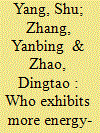| Srl | Item |
| 1 |
ID:
186730


|
|
|
|
|
| Summary/Abstract |
The gradual collapse of the work unit system and high population mobility have exacerbated Chinese urban dwellers’ life uncertainties, and many have been forced to invest less in their surroundings and become alienated from local life. This study posits that people’s passive alienation from local life is mainly due to certain cultural differences at the interpersonal level and a lack of cultural ties at the person-place level. Self-location, self-extension, and self-storage are the three main dimensions of reorganization that Chinese urban dwellers must consider in their local lives. Currently, Chinese urban dwellers’ local lives remain in a state of constant flux. Cultural memories of Chinese cities and beliefs regarding future culture continuity could play a role in the reorganization of Chinese urban dwellers’ local lives.
|
|
|
|
|
|
|
|
|
|
|
|
|
|
|
|
| 2 |
ID:
150912


|
|
|
|
|
| Summary/Abstract |
This research explores the possibilities for further energy saving in households in the Chinese context by conducting of a survey on energy curtailment behaviors. We examine how people's demographic characteristics and psychological factors affect their direct and indirect energy curtailment behaviors at home, as well as the different effects of these antecedents. Results suggest that people with high sense of environmental responsibility and curtailment attitude are more likely to engage in both direct and indirect energy curtailment actions. Generally, indirect energy curtailment behavior is more strongly related to psychological and socio-demographic factors than direct behavior, and these socio-demographic factors vary for direct and indirect behaviors. Interesting patterns emerged with respect to gender, age, family structure, family income, and level of education. Results indicate that strengthening publicity and education to increase environmental awareness among Chinese urban residents would be effective in reducing household energy consumption, especially when the said measures target a specific population and specific behaviors.
|
|
|
|
|
|
|
|
|
|
|
|
|
|
|
|